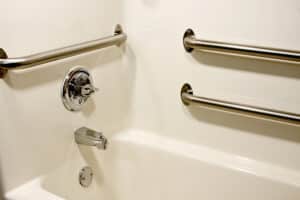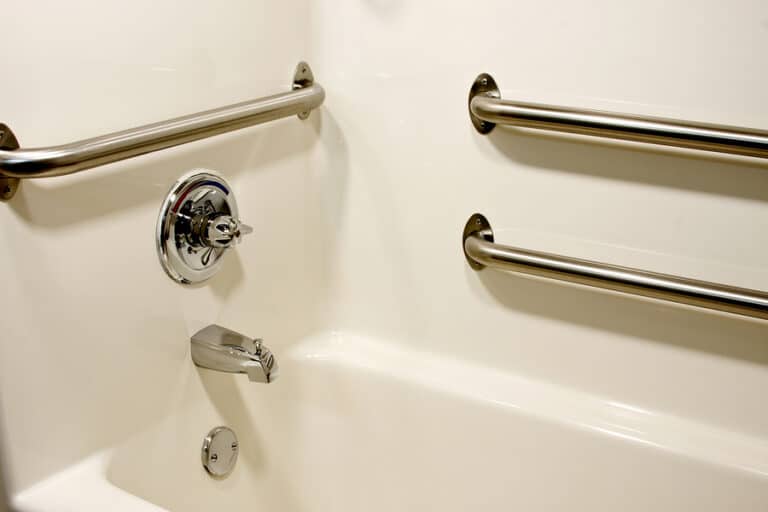As people age, their risk of falling increases, particularly in the bathroom, which is notorious for its slippery surfaces. Falls are the biggest cause of injury among seniors, and the bathroom is one of the most dangerous rooms in the house. Fortunately, some modifications may be implemented to reduce this risk, resulting in a safer environment that promotes freedom and mobility. With home care providers by their side, families can assess which modifications might be best for their loved ones.
Installing Grab Bars
Installing grab bars at certain points in the bathroom is one of the most effective ways to increase senior safety. These bars give them support when standing, help them transition from sitting to a standing position, and when moving from one place to the other.
Grab bars should be placed in the following key areas:
- Near the toilet to make it easier to sit and stand.
- Inside and outside the shower/tub to offer stability when entering or exiting that area.
- Along the walls, which can help seniors maneuver more easily, especially if the bathroom has a tight layout.
Home care can work with family members to ensure the grab bars are at the right height to give the most stability.
Nonslip Flooring and Mats
Slippery surfaces are a leading cause of restroom falls. The good news is there are some easy fixes to ensure seniors are safe, including installing non-slip flooring. Textured vinyl or non-slip tiles are great options to put in a senior’s bathroom. These materials offer better traction, even when wet, than smooth tiles or polished floors. Additionally, non-slip mats both inside and outside the shower or tub, as well as by the sink, can help reduce fall risks. Non-slip mats will have a rubber backing that holds them firmly to the floor.
Shower and Tub Modifications
Seniors frequently struggle to get in and out of bathtubs, increasing their risk of falling. There are several options to counter this, but they are a significant expense compared to the ideas already offered, which is something families will need to consider.
One option to improve safety is a walk-in bathtub. These bathtubs have low entry thresholds, which eliminates the need to step over a high ledge. They also frequently include built-in chairs, allowing for safer bathing while seated.
Another option is the zero-threshold shower, sometimes called a curbless or walk-in shower. These showers eliminate the need for a step-over entry and instead provide a flat entrance. This is especially important for seniors who use walkers or wheelchairs, as it gives them continued independence.
Finally, loved ones might also look into shower seats. A bench or seat in the shower lets seniors sit while they wash, decreasing fatigue and the risk of slipping on wet surfaces.

Improve Lighting
Proper lighting is vital throughout the house to prevent falls. In the bathroom, the right lighting minimizes the risk of tripping or misjudging distances, especially for seniors with vision issues. Another idea is to install motion lights that activate when seniors enter the bathroom so they can see more easily at nighttime.
These are just a few of the modifications that can be made to the bathroom so seniors are better protected. Home care and family members can work together to assess the bathroom space to see what might work best.
Sources: https://maserlaw.com/home-safety-tips-for-elderly-people-to-reduce-the-risk-of-falls
https://www.ncoa.org/article/how-to-prevent-falls-with-home-safety-modifications/
https://dailycaring.com/low-cost-bathroom-modifications-reduce-fall-risk/
If you are considering hiring a Home Care Service that is dedicated to the senior care market, contact 24/7 Coastal Contact today at (251) 260-0226.
Let us show you how and why we are different from any other service you may have tried in the past. Our team approach is the standard that sets us apart from the rest.
Prior to establishing 24/7 Coastal Contact, Ms. King worked for 30 years in the health care industry. Her experience began providing direct patient care. Eventually, she transitioned into home care and home infusion, then acquired her HCS-D certification as a Home Health specialty coder where she learned about the administrative burden facing Home Health and Home Care providers.
It became clear that after-hours customer service was a major toll home care industry and it was with this need in mind that 24/7 Coastal Contact was founded. Since 2018, 24/7 Coastal Contact has grown explosively. Now, we provide service to over 40 agencies in over 24 states with a 95% retention of service rate.
- How Home Care Helps Seniors Improve Their Diet While Aging in Place - April 15, 2025
- Celebrating Ebony & Her 3-Year Workiversary - April 4, 2025
- After-Hours Answering Service Provides Cost-Effective Customer Service 24/7 - April 1, 2025




